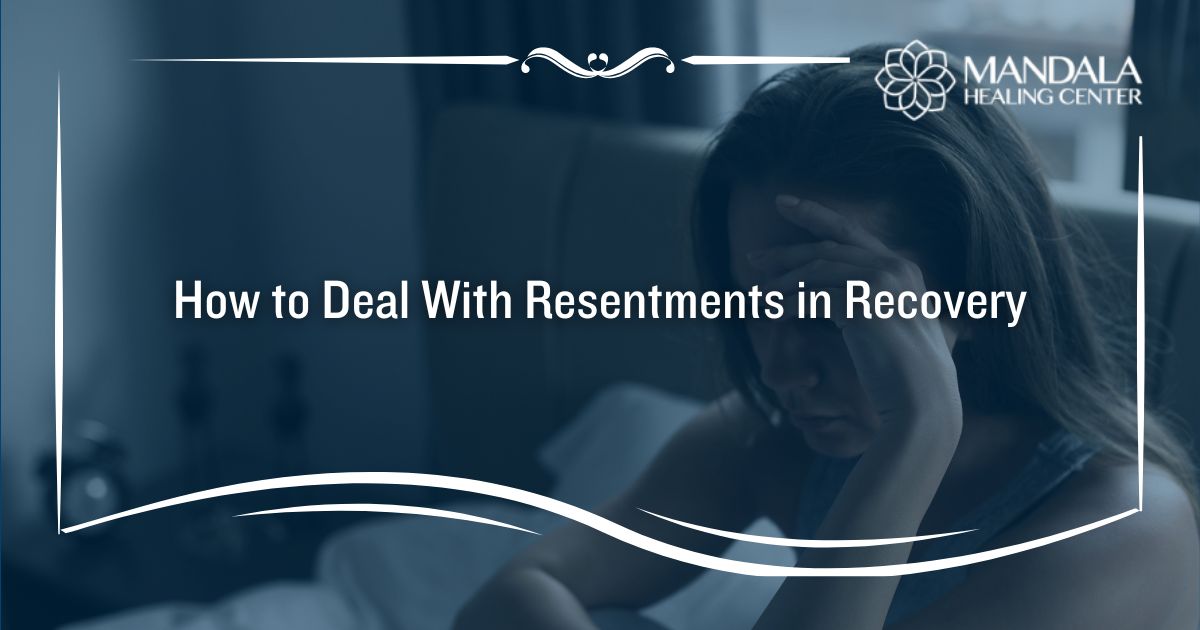Many factors can play a role in the development of addiction. One of the reasons you might begin abusing drugs and alcohol is strong or intense negative memories. Over time, these memories can cause you to hold resentment toward other people.
To explain, resentment is a complex emotion characterized by a buildup of negative feelings towards someone or something due to being mistreated or wronged. Feelings of resentment can be a motivator to continue abusing substances. Because of this, it is important to overcome any resentments you may suffer from when you are in recovery.
While addressing resentment can be difficult, some ways can make the process easier. First, you need to identify your resentments to figure out what you are feeling wronged. You could talk to a professional, journal your thoughts and feelings, meditate, and acknowledge the part you played in it.
In this article, you will learn:
- What resentment is
- What are the risks of keeping resentments
- How to deal with resentment in recovery
Tips for Dealing With Resentments in Recovery
Resentments are long-term negative emotions that we hold onto after we feel we have been wronged or offended in some manner. They are common among people in recovery from addiction and alcoholism. The big book from Alcoholics Anonymous speaks about resentment frequently.
In the book, it states that “resentment is the number one offender. It destroys more alcoholics than anything else.”[1] This quote explains the destructive nature of holding onto negative feelings when you are in recovery from addiction. In other words, keeping resentments alive can lead to a relapse.
Thankfully, there are a few ways to overcome resentment, including:
Identify Your Resentments
The first thing you should do is make a list of the people, places, or things you have resentments against. This could include family, friends, or even institutions. Identifying your resentments can help you gain a better understanding of why you experience such intense emotions.
Talk to a Professional
If you are dealing with resentment, you should speak to a professional therapist or counselor. They can help you identify the root causes of your resentment and provide you with coping mechanisms to help you overcome it.
Working a 12-Step Program
During a 12-step program, you will complete 12 different activities and actions to help you recover. The fourth step is well-known for being one of the more transformative steps in the program. It involves taking a personal inventory of resentments, fears, pride, and other issues.
Once you write out your resentments and wrongdoings, you will read the inventory to your sponsor during the 5th step. This gives you a chance to hear your sponsor’s viewpoint on your resentments. You will also receive advice on how to repair resentments, wrongdoings, and other issues you bring up during the process.
Journaling
Journaling can be a useful tool when dealing with resentment. You should write out your resentments and go into detail about what caused each of them. Writing out your problems helps you gain a neutral understanding of them and why they have developed.
By journaling your resentments, you might be able to identify some instances where you exacerbated the problem when you could have repaired it. If the resentment stems from a trauma, you might find that journaling helps you release some of the intense emotions that surround it.
Acknowledge Your Part
To overcome resentment, you have to examine the dynamics of the issue. More often than not, we play a part in our resentments without even realizing it. Acknowledging the part you played will help you let go of the intense grudges you are holding.
Questions to ask yourself when examining your resentments include:
- When I think about this resentment, what part did I play in it?
- When I tell people about the resentment, am I leaving any parts out of the story?
- How did my addiction and substance abuse play a role in this issue?
- How is it helpful to continue holding onto this resentment?
- Am I doing more harm to myself by keeping this resentment than I am to the other person?
The answers to these questions will help you gain a better understanding of your resentment. It will also make it easier for you to let them go. While letting resentment go can take some time, these tips can help you start the process.
Get Connected to a Top-Rated Drug and Alcohol Rehab Center
If you or a loved one suffers from addiction, it’s time to seek professional help. Drug and alcohol addiction treatment will provide you with the tools and support you need to achieve long-term recovery. At the Mandala Healing Center, we offer evidence-based treatments, including medical detox, behavioral therapy, and relapse prevention planning.
Why Choose The Mandala Healing Center? Clients are taken on a journey of healing through complete immersion into evidence-based clinical modalities, multifaceted alternative therapies, and expert medical management, allowing them to fully detox and recover from drug and alcohol addictions. Through a program of care designed to encourage change, a foundation is created that allows clients to find their higher purpose and reclaim their lives.
Contact us today for more information on how to get started.
References:
- Alcoholics Anonymous (AA): Daily Reflections












